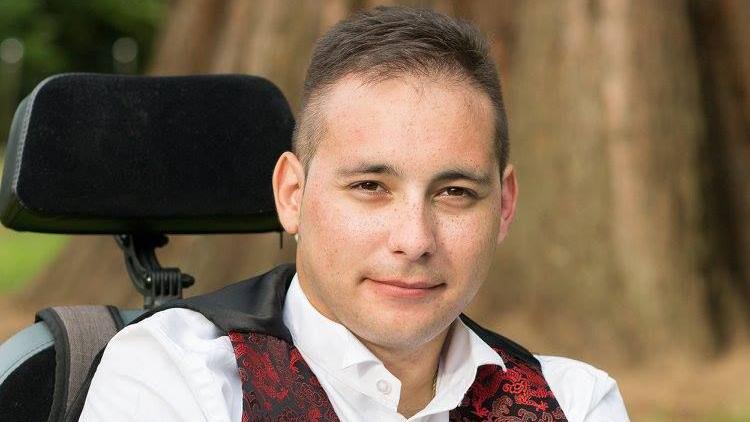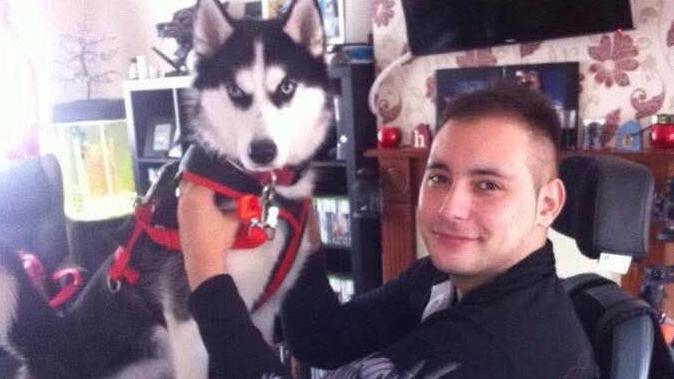Relaxant withdrawal 'could have led to man's death'

Karl Lee, who died in November 2020, had suffered life-changing injuries when he was hit by a taxi in 2008
- Published
An inquest has begun into the death of a 32-year-old father whose family believe was "denied" treatment he needed after going into hospital with severe pain and persistent spasms.
Karl Lee, who relied on a muscle relaxant pump to manage spasms after he was hit by a car in 2008, suffered a sudden cardiac arrest and died at Nottingham's Queen's Medical Centre in November 2020.
Mr Lee had suffered life-changing injuries when he was struck and later had his right leg amputated due to ongoing pain.
The family believe he could have been suffering from a withdrawal of the muscle relaxant baclofen when he died, which the inquest at Nottingham Coroner's Court, will explore.
Pump and implant
Mr Lee, from Clifton in Nottingham, was cared for by his family after the collision left him with knee damage.
After experiencing persistent pain in his right knee and associated spasms, Mr Lee was diagnosed with complex regional pain syndrome - a chronic pain condition that often follows an injury.
He was fitted with an intrathecal baclofen pump (ITB) - a device to deliver the muscle baclofen into his spinal fluid - to control spasms, which had to be periodically refilled.
He was also fitted with a spinal cord stimulator- an implanted device which passes small electrical fields to the spinal cord to help with pain.
Then in 2013, Mr Lee had his right leg amputated above the knee.
He remained under the care of a consultant neurosurgeon and the neurosurgical team at the Nottingham University Hospitals (NUH) NHS Trust for the management of his condition.

Mr Lee used a wheelchair after being struck by a car
On 16 November, Mr Lee was taken to the hospital's emergency department suffering from spasms, which his family said were "much worse" than usual, persistent sweating and confusion.
He was admitted to the hospital and was recorded to have a high heart rate and raised respiratory rate.
Mr Lee - who had recently completed two courses of antibiotics for a tooth abscess - was seen by a senior doctor who believed he could have sepsis, the court heard.
It was also discussed whether the antibiotics could have caused the spasms.
Mr Lee had also been diagnosed with epilepsy as a child but had not had an epileptic seizure since 2001- when he was 13 - and seizures were ruled out.
He was treated for possible sepsis and kept in hospital overnight, where his family raised concerns he might have been suffering from a baclofen withdrawal.
The inquest heard the neurosurgical team attended to Mr Lee while he was admitted, but it was unclear what had taken place.
However, notes showed the team had "no concerns" and contact details were left with the ward.
The court heard the following day, observations to monitor Mr Lee, including his blood pressure and respiratory rate, had improved, but his spasms continued.
On 18 November, shortly after being seen by medical staff, Mr Lee suffered a sudden cardiac arrest and died.
'Kind and compassionate'
Dr Monika Radzka, a consultant in acute medicine, who was involved in Mr Lee's care between 16 and 18 November, told the inquest while a baclofen withdrawal "was considered", it was not suspected.
Following a post-mortem examination, Mr Lee's cause of death was given as sudden unexpected death in epilepsy (SUDEP).
However on Wednesday, the pathologist Prof Ian Ellis, said he had been "mistaken", and having received more information about Mr Lee and hearing evidence, believed "on the balance of probability", he had suffered baclofen withdrawal.
The inquest heard Mr Lee's baclofen pump had been refilled about a month before his death but Prof Ellis said no baclofen was detected in his blood.
Prof Ellis said it was difficult to exclude baclofen withdrawal as a cause of death but said he did not think it was possible to be certain.
He added: "The evidence that [Mr Lee] had continuing sepsis was weak."
In a statement read to the inquest, Mr Lee's family said he was "a young man with so much to live for" including a young son.
"He was someone who was kind, caring, compassionate and deeply principled, always offering support to anyone he come into contact with," they said.
They added the "devastation" caused by Mr Lee's death was "exacerbated" by the handling of his case by NUH.
The inquest continues.
Get in touch
Tell us which stories we should cover in Nottingham
Follow BBC Nottingham on Facebook, external, on X, external, or on Instagram, external. Send your story ideas to eastmidsnews@bbc.co.uk, external or via WhatsApp, external on 0808 100 2210.